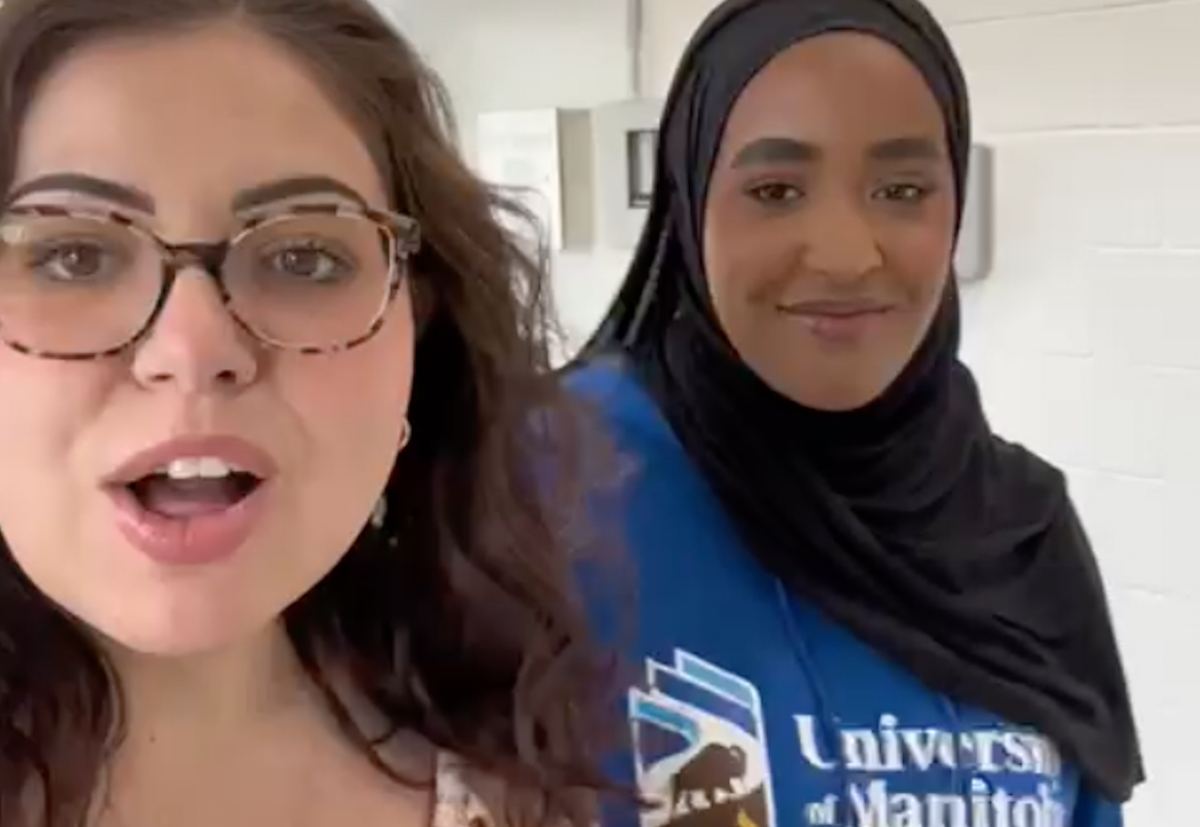
Students Morgan Hanson-Oliveira and Reem Elmahi.
Making connections on campus
Student educators for Office of Human Rights and Conflict Management help others feel safe and connected
The September hustle and bustle of campus is a favourite for Reem Elmahi and Morgan Hanson-Oliveira. Initial nervousness is replaced by anticipation and excitement, and the campus looks so beautiful in the autumn, they note.
Each fall, they look forward to reconnecting with the campus and with other students. They also love to help fellow students feel safe and connect on campus. That’s why, in addition to being students themselves, the two have worked together as student educators in the Office of Human Rights and Conflict Management (OHRCM) over the past year.
Morgan is originally from Thompson and after living in residence for years, the Fort Garry campus in particular has a very special place in her heart. Over those four years, she says, the university very much became home. Morgan was a resident-advisor on her floor for a year, while Reem volunteered for, and then spent two years as president of, the Black Students Union, which showed her the value of advocacy work. Advocacy work was something Reem found very interesting, she says, as “something I could see myself doing in the future.”
Reem is currently a student in the Faculty of Science who majored in psychology; she intends to pursue a law degree because she wants to continue to advocate for others. The two have that interest in advocacy and psychology in common, since Morgan is currently pursuing her psychology honours degree after an undergrad degree in the Faculty of Arts as a double major in women’s & gender studies and Native studies. Career-wise, she wants to do something related to therapy and mental health services and intends to follow up with graduate studies in a master’s degree and a PhD.
Connecting with OHRCM
Their own feelings of connection to campus and interest in student advocacy became major motivation for working with the Office of Human Rights and Conflict Management (OHRCM), and each of them decided to apply for one of the two student educator positions when those came up.
The office exists to help students, as well as faculty and staff, with education, advice, informal resolution and assistance in all matters relating to human rights, conflict and communication and UM policy — it oversees UM’s Respectful Work and Learning Environment (RWLE) and Sexual Violence policies and procedures. The office offers a safe and respectful environment for informal discussion of concerns and handles all inquiries in strict confidence.
Reem and Morgan say working as student educators as part of the Office of Human Rights and Conflict Management has been a uniquely rewarding experience.
“The people who work in that office are super, super nice, like beyond nice,” says Morgan. “They teach you how to treat other people and that’s its own education…. They have this way of expanding your education.”
As part of their work as student educators during the year, they did outreach with students about OHRCM and its services, and created a video to share more about how the office can help.
Morgan and Reem’s tips for getting comfortable with campus life and understanding student supports
It wasn’t always this way. Both Morgan and Reem recall being “super nervous” at first. Like the many students who flood to the University of Manitoba in fall, they stumbled through their first year and got more comfortable in time.
They note there are plenty of supports available for students — more than students may sometimes even realize. One place they suggest looking is the umanitoba.ca website under “Student supports” or at the end of a syllabus handed out by profs and instructors at the start of a course — where there’s “usually a whole page for student supports,” they say.
What’s their primary advice for someone just starting at UM?
“I would say, try to find a sense of community,” says Reem. “Try to join clubs, talk to people in your classes or before class. People are usually very friendly in the beginning of the year, especially first year.”
Morgan agrees and says, “Go to class and go to your lectures. Talk to people in the class and join group chats and study groups. If you’re having difficulty ask that somebody next to you what they think about the class.”
They also suggest checking the UMSU directory for clubs, where, they say, “there’s something for everyone,” from poetry to pottery, from knitting to pets!
“Explore different student groups and attend events, check posters and bulletin boards to find something interesting — “even if you go on your own,” they say.
Both say that coming to university, they’ve forced themselves to try new things and have enjoyed it as a result — even when it feels uncomfortable at first.
As Reem says, attending university meant “putting myself into experiences that I wouldn’t have done prior and just kind of stepping outside of my comfort zone.”
Morgan adds, “Just try it, and who knows — it could be one of the best experiences of your university career!
The Office of Human Rights and Conflict Management serves all UM campuses. Individuals from the office are available to meet with you virtually, by phone or in person.
human.rights@umanitoba.ca
204-474-6348
Find out more about how OHRCM can help at their website.






